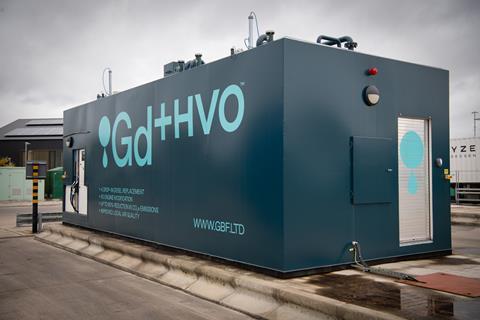Hydrogenated vegetable oil (HVO) fuel goes a long way to solving hauliers’ problems of cutting their carbon footprint, but the demise of a major supplier has also revealed deeper structural issues.

HVO has been heralded as a game changer for the industry’s transition to Net Zero, but for the UK’s largest supplier of the alternative fuel it also turned out to be game over.
Green Biofuels’ collapse into administration has exposed the cashflow difficulties of operating a fuel supply business attempting to expand at pace, but it has also revealed a huge row with HMRC over excise duty reclaims – one that continues to bubble away today.
One of the great benefits of using HVO is that no vehicle modifications are required. It can easily replace diesel and deliver carbon savings of up to 94%. But there are two problems that have yet to be overcome: one is its availability and the other is the price. For William Tebbit, Green Biofuels’ CEO, BP’s decision in 2022 to take a 30% stake in his business must have felt like the first half of that conundrum was solved.
Up to this point, its HVO was supplied by the Finnish fuel company Neste, but as Tebbit explained at the time, BP’s investment meant taking advantage of one of the biggest traders of biofuels in the world, with an enormous balance sheet to boot.
According to figures provided by administrator Ernst & Young (E&Y), in the year that followed, the company’s expansion plans rocketed. Draft figures show turnover ballooned from £50m in 2021 to £413m in 2022 and it even made a net profit of £6m.
But problems were brewing.
In a report to creditors, the administrator said: “As the company grew, it agreed pricing terms with several customers that were, prime facie, loss making relative to the purchase cost of the fuel. We understand this pricing strategy was aimed at driving up growth in customers and assumed the company would benefit from the partial or full repayment of the excise duty included in the purchase price and from the monetisation of the emissions/sustainability reporting certificates issued for the fuel by the producer.

“To date, HMRC has rejected significant excise duty reclaims and disagreed with the company’s interpretation of the relevant legislation.”
E&Y said that the value of these reclaims was £49m: “For a large proportion of these reclaims, the principle underpinning the reclaims had previously been rejected by HMRC and, at the date of the joint administrators’ appointment, the company was at various stages of appeal with HMRC and was also waiting on an application to the High Court for a judicial review of various aspects of HMRC’s decisions,” it added.
No-one Freight Carbon Zero approached was willing to go into the details of this dispute; E&Y said the matter was still being investigated and HMRC declined to comment on “ongoing litigation”.
However, an HMRC spokeswoman added: “It is our duty to ensure everyone pays the right tax under the law. Resolving a dispute by agreement is likely to be the most effective and efficient outcome but HMRC will not compromise on its view of the law to secure agreement. HMRC’s success rate for all decided appeals across all tribunals and courts was 91.8%.”
Regardless, as 2023 wore on, BP was tiring of its investment. It agreed to additional funding of £12m in August, but when Green Biofuels asked for another £2m just a few weeks later its patience was running on vapours: “BP Oil agreed to provide additional funding of £2m but required greater visibility in respect of a refinance,” E&Y said. “Based on the evidence provided by the directors and their legal advisors in meetings held on 26 September and 29 September 2023, BP Oil did not consider a satisfactory refinance was achievable.”
Green Biofuels entered administration three days later, with Certas snapping up the business, assets and 28 staff later in November.
Jamie Hartles, CEO at Howard Tenens Logistics, which provided transport and an asset for fuel storage, said the collapse came as “a huge surprise”.
He said: “We thought the more we can help them get HVO out there, the better the world will be. As a fuel, in terms of the cost of it versus the benefits, there’s nothing else we have found that’s as accessible and delivers as much carbon saving as HVO. The challenge is, it’s difficult to say to clients there’s a big carbon saving but potentially it will be 30-40ppl more.”
Tebbit was reluctant to say too much about the situation; he told FCZ there was a lot of process to go through yet, but that he “loved” the renewable sector and that HVO was a “fantastic product.”
Most would agree. Colin Matthews, an independent consultant specialising in low carbon fuels said HVO was a strong option for hauliers: “The challenges to suppliers of such fuels is balancing the rapid supply volume growth whilst being aware of duty payments and fluctuating renewable transport fuel certificate values, which can quickly impact the cash flow requirements of the business,” he said.
“Hence fixed price deals can quickly cause severe challenges. Looking at the administrators’ report, this appears to have been the likely cause of Green Biofuels’ demise.”


















